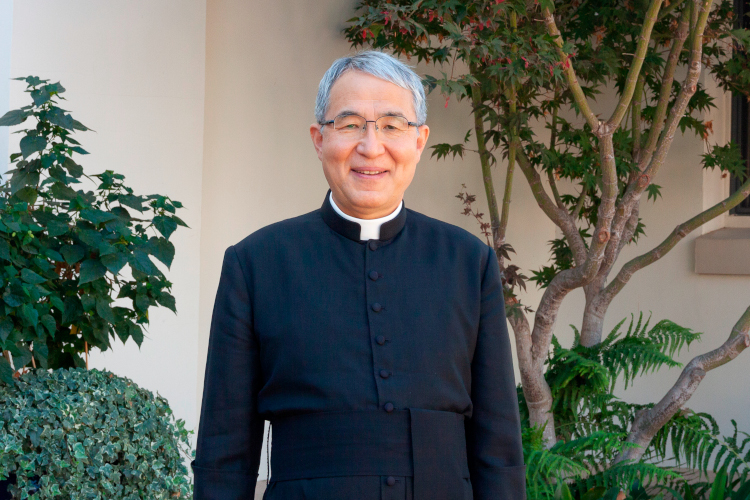- Home
-
About
 Fidelity & Excellence
Fidelity & ExcellenceThomas Aquinas College is unique among American colleges and universities, offering a faithfully Catholic education comprised entirely of the Great Books and classroom discussions.
-
A Liberating Education
 Truth Matters
Truth MattersTruth, and nothing less, sets men free; and because truth is both natural and supernatural, the College’s curriculum aims at both natural and divine wisdom.
-
A Catholic Life
 Under the Light of Faith
Under the Light of FaithThe intellectual tradition and moral teachings of the Catholic Church infuse the whole life of Thomas Aquinas College, illuminating the curriculum and the community alike.
-
Admission & Aid
 Is TAC Right for You?
Is TAC Right for You?Do you enjoy grappling with complex questions? Are you willing to engage in discussions about difficult concepts, with the truth as your ultimate goal?
-
Students & Parents
 Mind, Body & Spirit
Mind, Body & SpiritThere is always something to do at TAC — something worthwhile, something fulfilling, and something geared toward ever-greater spiritual and intellectual growth.
-
Alumni & Careers
 What Can You Do with a Liberal Education?
What Can You Do with a Liberal Education?Nothing speaks more to the versatility of the College’s academic program than the good that our alumni are doing throughout the Church and the world.
- Search
- Giving
Homily: Fr. Chung on Gossip

by Rev. John Mary Chung
Chaplain
Thomas Aquinas College, California
Homily for the Thirty-second Sunday in Ordinary Time
November 10, 2024
Today’s Gospel calls us to look closely at the hearts of the scribes, who “like to go around in long robes” basking in the praise of others, while acting unjustly. Their hypocrisy and arrogance lead us to reflect on one form of sin that often follows from pride: the sin of gossip.
One day, an elderly woman known in the community for frequent gossiping came to St. Philip Neri for confession. Although she recognized gossip as a flaw, she did not see it as something particularly harmful. St. Philip decided to give her an unusual penance. He instructed her to go home, find a feather pillow, and bring it to the top of a tall building in the neighborhood. Once she reached the top, she was to cut open the pillow and shake out all the feathers into the wind.
“Brothers and sisters in Christ, when tempted to gossip, we should ask ourselves: Does this conversation honor the dignity of our brother or sister? Is it rooted in pride or love?”
Confused but trusting, she followed his instructions, watching as the feathers scattered far and wide across the town. Then she returned to him, ready to receive absolution. But he told her, “Now go and collect every feather you have scattered.” Shocked, she replied, “Father, that is impossible! The feathers have flown everywhere!” He gently responded, “Just as you cannot gather up those feathers, you cannot take back the words of gossip once they are spread.”
Gossip may seem trivial — a passing comment or a bit of idle talk — but, left unchecked, it can become destructive. Gossip plants seeds of suspicion, judgment, and discord, undermining the unity of communities. Scripture is clear on this. Proverbs says, “Death and life are in the power of the tongue, and those who love it will eat its fruits” (Prv 18:21).
Our words have the power to bless or to wound. Gossip is often driven by a desire to elevate ourselves and usually involves diminishing others, making ourselves appear morally superior. Our Lord instructs us to remove the log from our own eye before we try to address the speck on our brother’s (Mt 7:3-5). St. Paul also warns against this sin, stating: “Let no evil talk come out of your mouths, but only such as is good for edifying, as fits the occasion, that it may impart grace to those who hear” (Eph 4:29). St. James adds, “If anyone thinks he is religious, and does not bridle his tongue but deceives his heart, this man’s religion is vain” (Jas 1:26). He warns that the tongue is like a fire that can quickly consume friendships and faith communities, becoming an uncontrollable blaze (Jas 3:6).
Saints have also cautioned us to guard our speech as a sign of charity. St. Philip Neri suggested that we never repeat in our neighbor’s absence what we would not say in their presence. St. John Climacus and St. John Chrysostom add that there is nothing more grievous than the sin of gossiping, as it is the easiest to commit and the hardest to correct. St. Bernard of Clairvaux referred to gossip as a kind of spiritual cannibalism, where we seek to devour another person’s reputation and dignity for our own gain, like the scribes in today’s Gospel who “devoured the houses of wives.” St. Thomas emphasizes that we would consider others’ good reputation — “a better possession than riches” — sacred, respecting their dignity as fellow children of Christ.
Brothers and sisters in Christ, when tempted to gossip, we should ask ourselves: Does this conversation honor the dignity of our brother or sister? Is it rooted in pride or love?
As members of the Christ’s body, we are called to uphold one other in charity, even if it means addressing faults privately (Mt 18:15). Silence and prayer help us reflect on our motives, helping us discern when to speak and when to remain silent.
Remember that gossip often comes from curiosity (1 Tm 5:13) or restlessness (Jas 3:8). And turning our hearts to God can bring the peace that controls this urge. Let us assume the best of others, aware that we rarely understand the full story behind their actions. Let us resolve today to speak the words that heal, not harm; build up, not tear down; and unify, not divide — striving always to speak in a way that conveys our love for God and for another.

